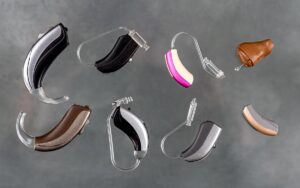There are plenty of health reasons to keep in shape, but did you realize weight loss supports improved hearing?
Studies have established that exercising and eating healthy can improve your hearing and that individuals who are overweight have a higher chance of experiencing hearing loss. Learning more about these connections can help you make healthy hearing decisions for you and your family.
Adult Hearing And Obesity
Women are more likely to experience hearing loss, according to research done by Brigham And Women’s Hospital, if they have a high body mass index (BMI). BMI measures the relationship between body fat and height, with a higher number indicating higher body fat. Of the 68,000 women who participated in the study, the amount of hearing loss increased as BMI increased. The participants who were the most overweight were as much as 25 % more likely to experience hearing loss!
In this study, waist size also ended up being a reliable indicator of hearing impairment. Women with larger waist sizes had a higher chance of hearing loss, and the risk increased as waist sizes increased. And finally, incidents of hearing loss were reduced in individuals who took part in regular physical activity.
Obesity And Children’s Hearing
A study by Columbia University’s Medical Center revealed that obese teenagers had about twice the risk of experiencing hearing loss in one ear when compared to non-obese teenagers. Sensorineural hearing loss, which develops when the delicate hair cells in the inner ear are damaged, was common in these children. This damage resulted in a decreased ability to hear sounds at low frequencies, which makes it difficult to hear what people are saying in crowded places, such as classrooms.
Children usually don’t notice they have a hearing issue so when they have hearing loss it’s particularly worrisome. There will be an increasing danger that the issue will get worse as they become an adult if it’s not treated.
What is The Connection?
Researchers suspect that the association between obesity and hearing loss and tinnitus lies in the health symptoms related to obesity. High blood pressure, poor circulation, and diabetes are some of the health problems caused by obesity and linked to hearing loss.
The inner ear’s anatomy is very sensitive – comprised of a series of little capillaries, nerve cells, and other delicate parts that have to remain healthy to work effectively and in unison. It’s essential to have strong blood flow. This process can be hindered when obesity causes narrowing of the blood vessels and high blood pressure.
Decreased blood flow can also damage the cochlea, which receives sound waves and sends nerve impulses to the brain so you can distinguish what you’re hearing. If the cochlea gets damaged, it’s normally permanent.
What Should You do?
Women who stayed healthy and exercised regularly, according to a Brigham and Women’s Hospital study, had a 17% lowered likelihood of getting hearing loss in comparison with women who didn’t. Lowering your risk, however, doesn’t mean you have to be a marathon runner. The simple routine of walking for at least two hours per week can reduce your risk of hearing loss by 15%.
Your whole family will benefit from eating better, as your diet can positively impact your hearing beyond the advantages gained from weight loss. If there is a child in your family who has some extra weight, talk with your family members and put together a program to help them shed some pounds. You can show them exercises that are fun for children and work them into family gatherings. They may enjoy the exercises so much they will do them on their own!
If you believe you are experiencing hearing loss, consult a hearing specialist to discover whether it is related to your weight. Weight loss stimulates better hearing and help is available. Your hearing specialist will identify your level of hearing loss and advise you on the best course of action. If necessary, your primary care doctor will recommend a diet and exercise routine that best suit your individual needs.
[blogcta]





